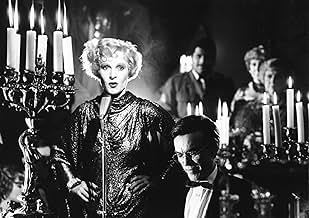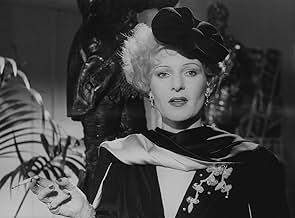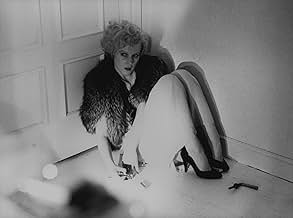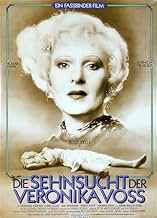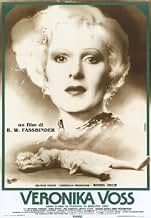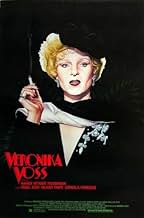IMDb-BEWERTUNG
7,6/10
7970
IHRE BEWERTUNG
WI fand Ruhm unter dem Nazi-Regime, aber Wald Karriere wurde danach zerstört, Veronika Voss ist eine einst prominente UFA Schauspielerin, gehalten von ihrem Arzt, wirft Verdacht in einem Spo... Alles lesenWI fand Ruhm unter dem Nazi-Regime, aber Wald Karriere wurde danach zerstört, Veronika Voss ist eine einst prominente UFA Schauspielerin, gehalten von ihrem Arzt, wirft Verdacht in einem Sportjournalist.WI fand Ruhm unter dem Nazi-Regime, aber Wald Karriere wurde danach zerstört, Veronika Voss ist eine einst prominente UFA Schauspielerin, gehalten von ihrem Arzt, wirft Verdacht in einem Sportjournalist.
- Auszeichnungen
- 4 Gewinne & 4 Nominierungen insgesamt
Günther Kaufmann
- G.I.
- (as Günter Kaufmann)
- …
Handlung
WUSSTEST DU SCHON:
- WissenswertesBased on the true story of German film star Sybille Schmitz.
- PatzerThe film is set in 1955 but the song "The Battle of New Orleans" by Johnny Horton, released in 1959, is heard on the radio a number of times.
- Zitate
Dr. Marianne Katz: Artists are different from ordinary people. They are wrapped up in themselves, or simply forgetful.
Ausgewählte Rezension
This sumptuous black and white period piece, tells the story of a once famous film star, Veronika Voss (Rosel Zech). After a chance encounter on a bus with Robert Krohn (Hilmar Thate), there lives are entwined, with Krohn finding himself trapped in a cat-and-mouse search for Voss's sanity, her past lives, and the many sycophants and gold diggers in 1950's Germany. Voss, now struggling to find work after a highly successful period, particularly in the 1940's, is addicted to drugs and alcohol and has paranoid delusions when out on the street; Krohn is pulled into this as he did not recognise who she was, and she vaguely sees him as protection.
One of the last of Fassbinder's films - he died of an overdose (the official conclusion was suicide) in 1982 - which was also the last of a trilogy focusing on Germany's economic boom in the 1950's (the others being The Marriage of Maria Braun (1979) and Lola (1981)), the film also reflects some of the themes that the New German Cinema at the time. It was a time that Germany was reflective of World War 2, and the trauma that prevailed in a country torn between guilt and a resurgence of decadence and wealth as in the 1920's Weimar Republic. It is stated in the film that Voss's best period was during this period, and that she had been the star of Nazi Germany. After the fall of Nazi domination, she was cast aside.
Like Billy Wilder's Sunset Boulevard (1950), Veronika Voss highlights an industry that can easily create monsters, and also devastate lives. But unlike Wilder's subtle version of lost fame, Fassbinder shows the devastating effects of drug addiction, and the underbelly of society that is encountered in this process. Historically though, this is deeper and a hell of a lot more emotionally charged and interesting than Sunset. After all, this is not a Hollywood story, but is a post-World War 2 story of judgement, and loss after such a integrally debasing event in human history. How do you continue after working under the despotic power of the Nazi party? The elements of Nazi Germany are still in process, in the form of Veronika's control.
The film is said to be based upon the real-life German film actress, Sybille Schmitz, who died of an overdose in 1955 at the tender age of 45. The film shows shows that the shadow of the war had a lasting effect on the German nation, that would take decades to come to terms with. This is film making par excellence. Haunting, beautiful, with a climax that is inevitable, shocking, but very satisfactory. Rosel Zech's performance is pitch perfect, her face in a constant state of anguish.
www.the-wrath-of-blog.blogspot.com
One of the last of Fassbinder's films - he died of an overdose (the official conclusion was suicide) in 1982 - which was also the last of a trilogy focusing on Germany's economic boom in the 1950's (the others being The Marriage of Maria Braun (1979) and Lola (1981)), the film also reflects some of the themes that the New German Cinema at the time. It was a time that Germany was reflective of World War 2, and the trauma that prevailed in a country torn between guilt and a resurgence of decadence and wealth as in the 1920's Weimar Republic. It is stated in the film that Voss's best period was during this period, and that she had been the star of Nazi Germany. After the fall of Nazi domination, she was cast aside.
Like Billy Wilder's Sunset Boulevard (1950), Veronika Voss highlights an industry that can easily create monsters, and also devastate lives. But unlike Wilder's subtle version of lost fame, Fassbinder shows the devastating effects of drug addiction, and the underbelly of society that is encountered in this process. Historically though, this is deeper and a hell of a lot more emotionally charged and interesting than Sunset. After all, this is not a Hollywood story, but is a post-World War 2 story of judgement, and loss after such a integrally debasing event in human history. How do you continue after working under the despotic power of the Nazi party? The elements of Nazi Germany are still in process, in the form of Veronika's control.
The film is said to be based upon the real-life German film actress, Sybille Schmitz, who died of an overdose in 1955 at the tender age of 45. The film shows shows that the shadow of the war had a lasting effect on the German nation, that would take decades to come to terms with. This is film making par excellence. Haunting, beautiful, with a climax that is inevitable, shocking, but very satisfactory. Rosel Zech's performance is pitch perfect, her face in a constant state of anguish.
www.the-wrath-of-blog.blogspot.com
- tomgillespie2002
- 5. Okt. 2011
- Permalink
Top-Auswahl
Melde dich zum Bewerten an und greife auf die Watchlist für personalisierte Empfehlungen zu.
- How long is Veronika Voss?Powered by Alexa
Details
- Erscheinungsdatum
- Herkunftsland
- Sprachen
- Auch bekannt als
- Veronika Voss
- Drehorte
- Produktionsfirmen
- Weitere beteiligte Unternehmen bei IMDbPro anzeigen
Box Office
- Budget
- 2.600.000 DM (geschätzt)
- Bruttoertrag in den USA und Kanada
- 8.144 $
- Eröffnungswochenende in den USA und in Kanada
- 11.623 $
- 16. Feb. 2003
- Weltweiter Bruttoertrag
- 8.148 $
- Laufzeit1 Stunde 44 Minuten
- Farbe
- Sound-Mix
- Seitenverhältnis
- 1.66 : 1
Zu dieser Seite beitragen
Bearbeitung vorschlagen oder fehlenden Inhalt hinzufügen

Oberste Lücke
By what name was Die Sehnsucht der Veronika Voss (1982) officially released in India in English?
Antwort
